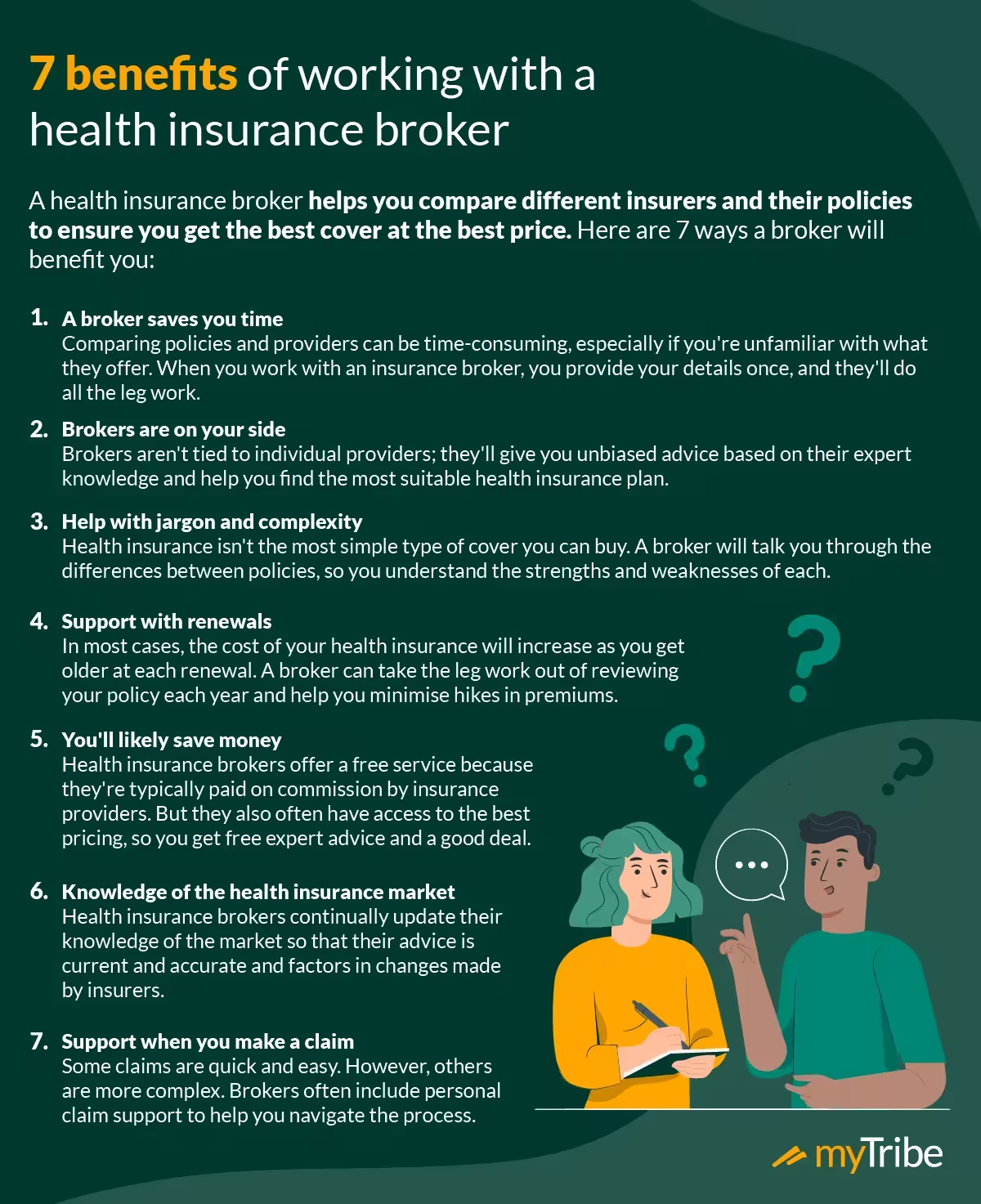Why an experienced health insurance broker is worth their weight in gold
Health insurance should enable you to access the medical care you need when you need it most. That said, it can be a tricky area to navigate, especially if you’ve never taken out health cover before, but that’s where an experienced health insurance broker can help; here’s how.


One minute read
With health insurance being so complicated, in many cases, it'll take years for a broker to understand the ins and outs so they can provide valuable advice.
While there's nothing wrong with advisers who are new to the industry, they likely haven't seen the pitfalls first-hand, so if you can find an experienced broker, one that's been in the business for over three years, hold on to them, as they are worth their weight in gold.
- Related Guide: Find our more about private health insurance is and how it works.
Why it's always wise to compare before you buy
Buying directly from an insurer may seem simpler, but there are downsides you should be aware of. Their online quote systems rarely show all available plan options, and if you speak with them, they can only tell you about their own products, not advise you based on your situation.
An experienced broker can show you the full picture and help you find the right cover at the best price.
When you compare through myTribe, we match you with a health insurance broker that is vetted and actively monitored for customer satisfaction, speed and reliability of communications, and knowledge, so you get a genuine product expert helping you, not just a sales call. To get a personalised market comparison, please click below, and remember to let us know how you get on.

Insurance brokers act as a liaison between you and insurance companies. Their role is to help you find the best insurance according to your needs and your budget. Brokers will usually manage the claims process on your behalf as well, streamlining the whole process for you.
Brokers cover a wide range of products, but they can be particularly helpful if you’re looking for a more specialist type of policy, such as business insurance, life or health insurance.
A broker can also help you if you’re struggling to find affordable insurance because of your risk profile, for example, if you want private medical cover but have a history of poor health.
If your insurance needs are relatively simple, you won’t necessarily need an insurance broker, but the benefits of using one include:
Health insurance can feel overly complex. This is often because of unfamiliar terminology, and the fact that there’s no real standardisation within the sector as health insurers all work to their own conditions.
A broker with experience in the health insurance market will be able to take you through all the available options and (more importantly), explain what it all means in plain English. In an area like health insurance, this expertise can prove invaluable, as they’ll be able to discuss specific terms and conditions, along with any limitations to the policy so that you fully understand what’s covered.

Using a broker should not make any difference to your premium. In other words, your premium won’t be increased in order to cover the broker’s fee.
Part of a broker’s job is to ensure you get the right policy at the best price. This doesn’t always mean you’ll get the cheapest policy on the market, but it should mean you get value for money and a policy that reflects your own healthcare needs.
Brokers typically have access to a wider range of policies compared to what you might find on a comparison site. Often, the policies they have access to are also more competitively priced.
As with all careers, experience goes a long way. In terms of health insurance, an experienced broker is more likely to have an extensive knowledge of the market and of all the products available in comparison to someone who’s just started.
Experience can also mean brokers are more aware of potential pitfalls, particularly surrounding pre-existing conditions and the claims process, as well as the policy itself. As well as their expert technical knowledge, an experienced broker may also encourage you to see the bigger picture, for example, if having children is on the horizon, they may steer you towards a policy with more child or family-friendly terms.
It’s also important not to underestimate how important experience can be in finding suitable cover if your needs are very specific, or you’re concerned about your own long-term health.
This isn’t to say that insurance brokers new to the industry can’t give you the same advice. It is simply that their knowledge may not be as in-depth or broad.
Plus, don’t forget that brokers can also help with the claims process itself. Someone experienced, or with a team behind them will have had more practice in processing claims efficiently.
Insurance brokers all work slightly differently but the main steps include:
Brokers must be listed on the Financial Services Register. The register is overseen by the Financial Conduct Authority (FCA) and helps ensure that anyone providing a regulated service (such as financial advice) is operating fairly and honestly and acting in the interests of the consumer.
Using a regulated broker also means you’re protected through the Financial Ombudsman Service and the Financial Services Compensation Scheme. This ensures that if you have a complaint or lose money through the arrangement, you can find a resolution or seek compensation.
You can check the financial services register for free at the Financial Conduct Authority. You should also make sure the broker is authorised to provide the specific service they’re offering. The register clearly lists the activities each firm or individual can carry out, for example, insurance, investment advice, consumer credit.
You can also find a regulated insurance broker using the British Insurance Brokers’ Association (BIBA) search facility. BIBA is an insurance trade association so unlike the Financial Services Register, firms and individuals do not have to join (so don’t panic if the broker you use isn’t a BIBA member).
The Association of Medical Insurers and Intermediaries (AMII) is another trade association but it’s specifically for anyone offering advice about health insurance. Again, brokers don’t have to be a member of AMII but if they are, it means they’ve made a promise to work to a code of conduct.
If you’ve found a suitable broker, it’s also worth taking a look at any reviews you can find. If you can, use independent sites rather than the broker’s own website (if they have one). Recommendations are also a good way to find a broker so if you know anyone with private health insurance, ask them if they can recommend someone.
If you want to feel prepared before consulting a broker for the first time, you can find out more about health insurance in our series of in-depth guides, including how to get private healthcare, the average cost and how premiums work.
You can also search for a policy using our comparison tool which can give you a good idea of what’s available before you speak to an expert.
What our readers say
We are rated Excellent on Google from 150+ reviews. Our reviews relate to the service provided by both myTribe and its partners.
Disclaimer: This information is general, and what is best for you will depend on your personal circumstances. Please speak with a financial adviser or do your own research before making a decision. The brokers we work with provide a comparison service from a panel of some of the UK’s top health insurers. Not every broker works with all the insurers listed in our guides.









